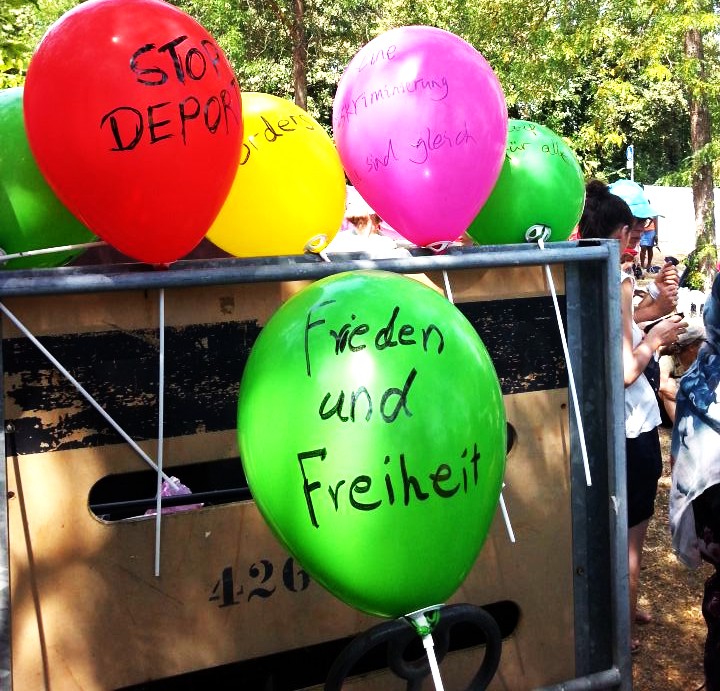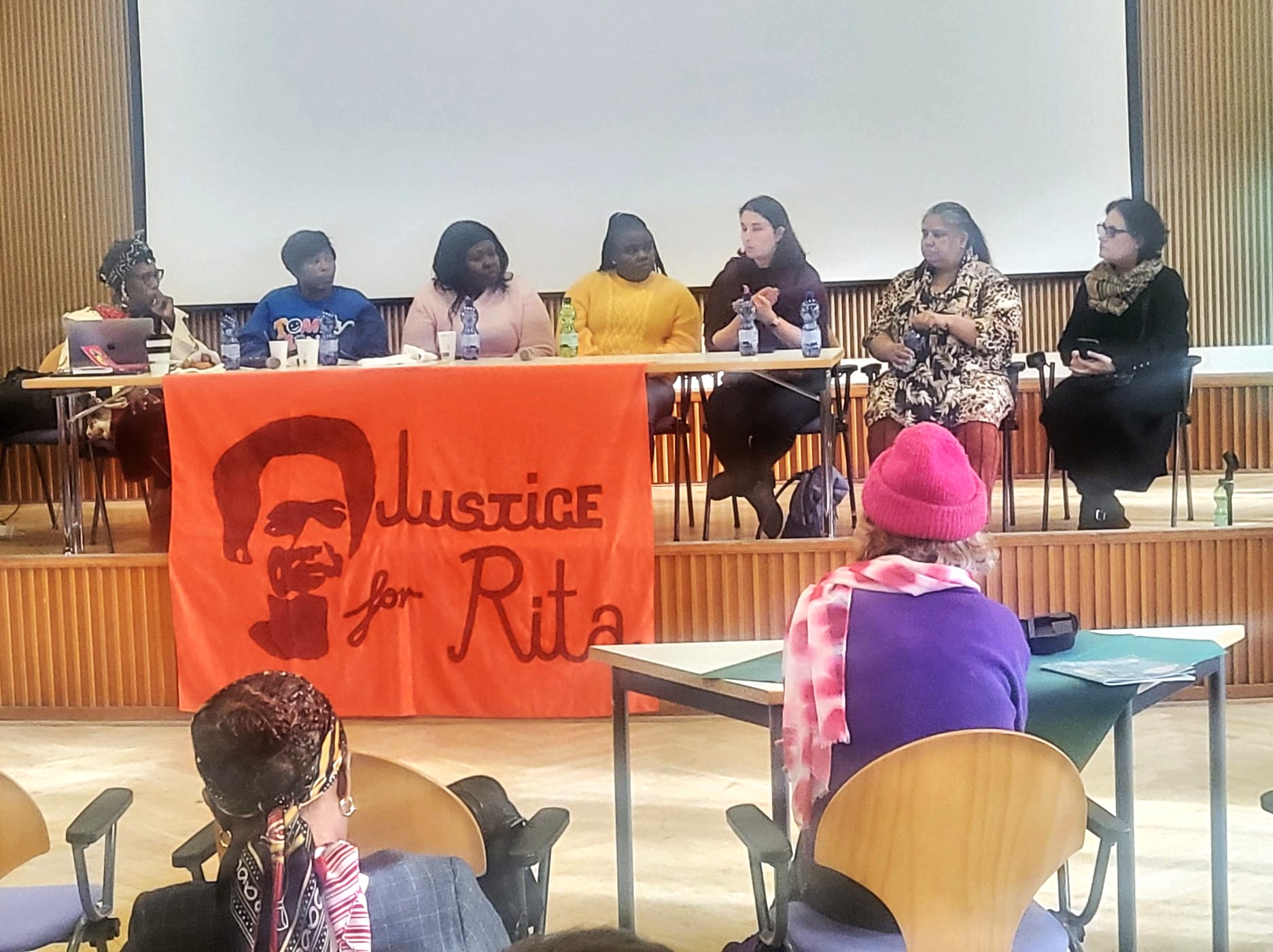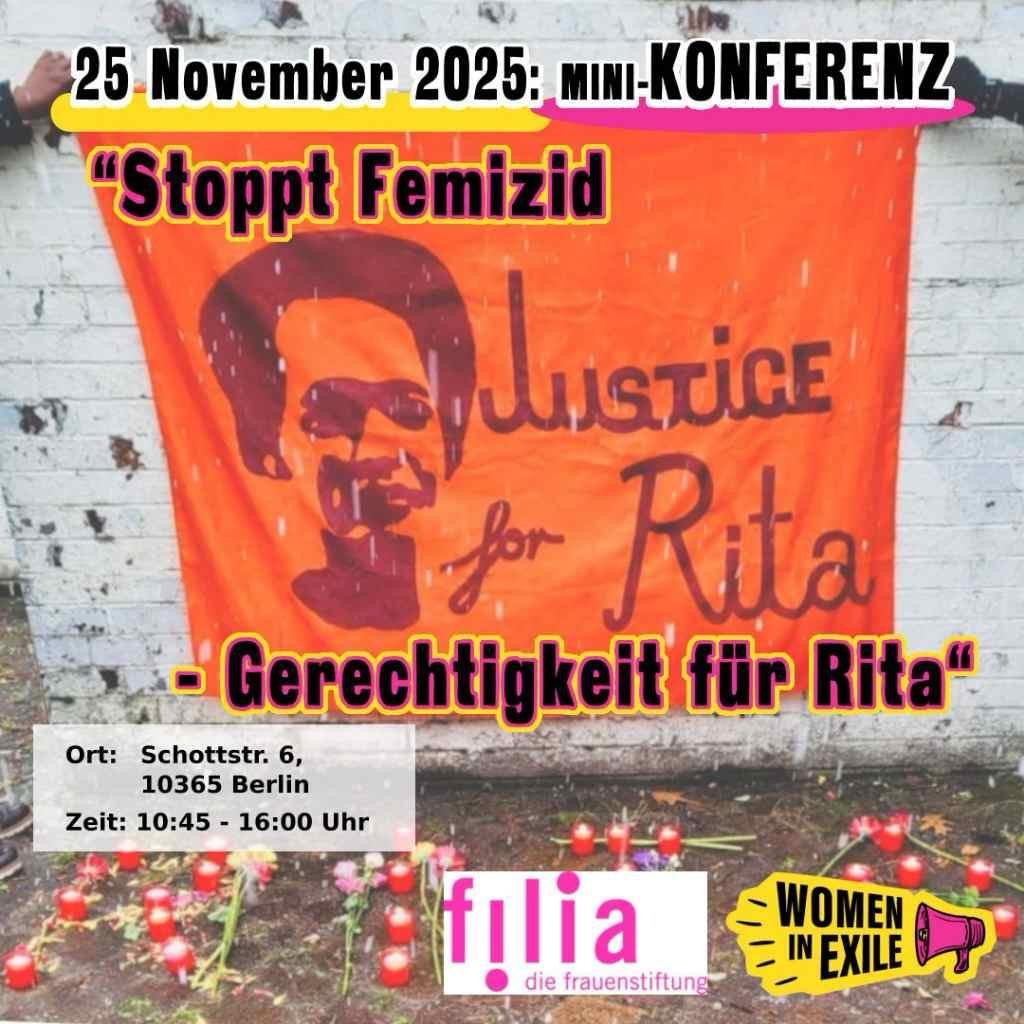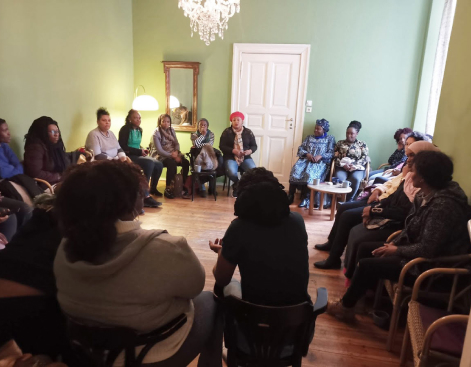This summer, we hosted a national and international event at the Oranienplatz in Berlin, Germany. The three-day event with the theme: “No borders, No lagers, Intersectional Arts & Culture Festival”; took place from 23. -25. August. Both sides of Oranienplatz were occupied by refugees and people without a history of flight from different parts of Germany. There were also international guests from different parts of the world, some of whom were facilitators of some of the workshops. The whole place was beautifully decorated with a stage, banners and tents. There were workshops, creative activities, art exhibitions, panel discussions and an archive of the work of Women in Exile. Under our motto “Breaking Borders to Build Bridges”, the festival brought together anti-racist, queer, feminist and anti-colonial groups who actively helped organise and/or participated in various roles and tasks.
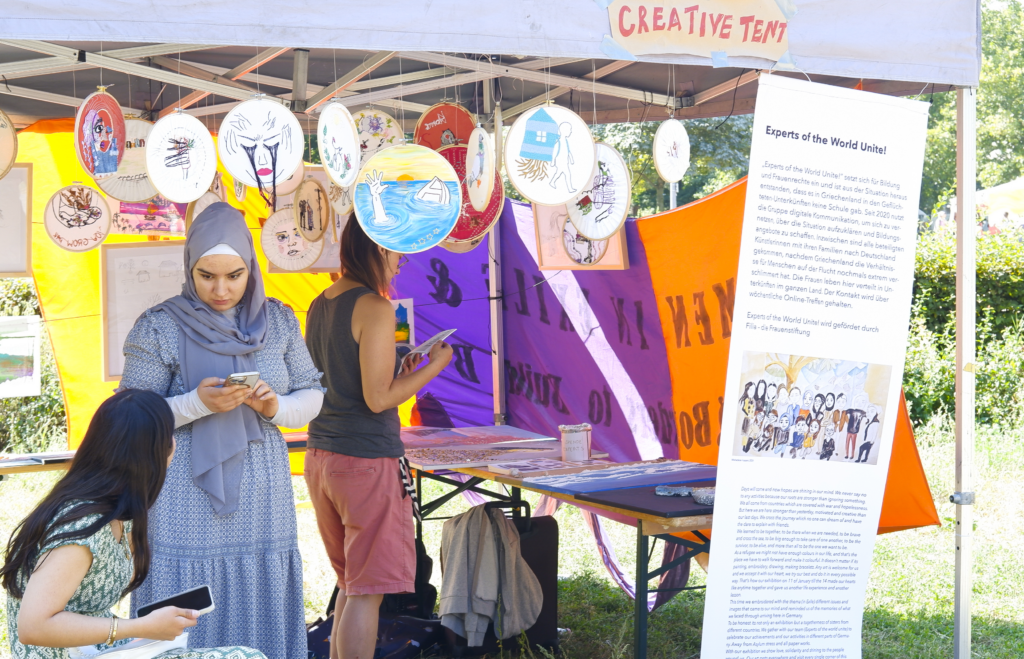
In this way, Through the power of art and culture, international and local activists and artists came together to celebrate diversity, promote understanding and empower each other. Doing this in an artistic, creative and empowering way is particularly important right now: as racism, queerphobia and sexism are on the rise and new discriminatory laws on refugees are being put in force. The result is a policy that is increasingly in favour of isolation, deportation and unequal treatment rather than
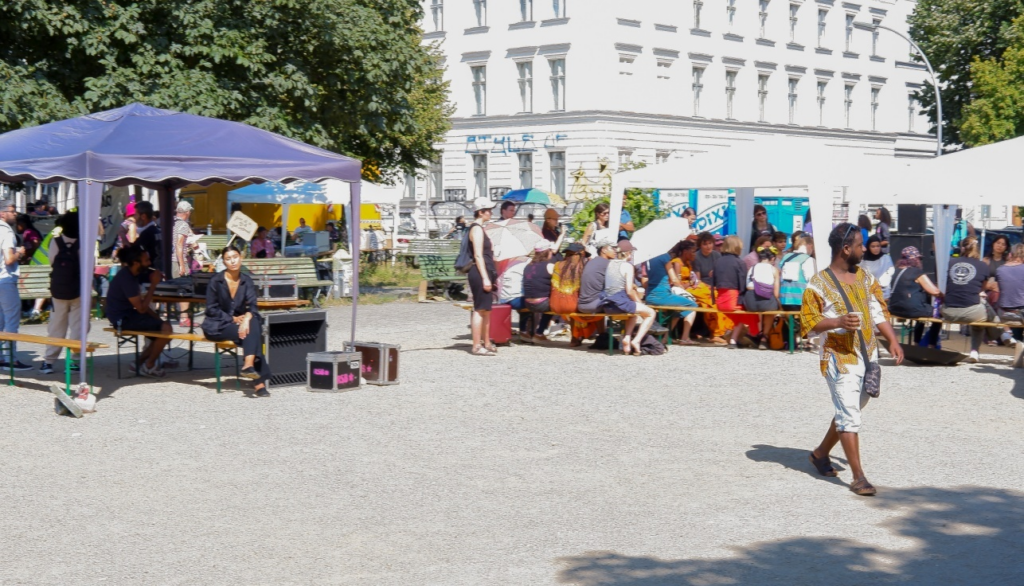
upholding human rights. Examples include the CEAS reform, the so-called ‘Deportation Improvement Act’ and the introduction of the discriminatory payment card. In addition, LGBTINQ*+ refugees, women* and children are still forced to live in inhuman conditions in camps. The festival’s diverse programme was a powerful statement against these policies of inequality and discrimination.
The above aspects were also presented in two panels, represented by national and international activists. The common questions to all were, among others;
- Do you recognise that the feminist struggle against oppression is divided?
- What does it matter if the women* are from different religions or cultures?
- Do we, as political activists, cultivate racial knowledge?
The “Future Imaginations” workshop was presented by the delegates from Senegal with the aim of creating a future city in which the participants would like to live. Using artistic creativity to think “out of the box” and push the boundaries of our imagination to build new possible futures.
From three groups, ideas of three different cities came up, the first one was created by the sea, with energy power and different social amenities.
The second group decided to create a city with small and modular neighbourhoods. The idea was to be able to walk everywhere, with mobile houses that could be moved as the needs of the inhabitants changed. Nature was also important, so a forest and river were present. A cultural centre, as a multi-functional space for all kinds of activities, concerts, etc. In this city there would be no cars or vehicles, except for communal needs

where a car or boat would be used for transport, the rest would be bicycles. Public services such as hospitals, schools and libraries would be grouped together in this city.
The third group came up with a gender-neutral green city with similar social facilities to the second group, with no cars but bicycle lanes and waterways. Electricity would be generated by solar panels and nature would play an important role.
The Dominican delegation, through a conversation, shared their personal and collective experiences and details about the creative and action processes of street art interventions in the Dominican Republic and of the Black Popular Percussion.
They talked about La Salve and Los Palos and the police/state repression against black spiritual street art expressions. They talked about the general steps of the processes involved, so that other collectives could experiment with them and also share information about the risks, benefits and limitations of these actions. The whole festival had the opportunity to listen to their traditional drumming during the closing ceremony and also when commemorating the life of Sulti an activist from Oplatz movement.
Network against Femicide- presentation of the kurdish women`s office for peace
The kurdish women`s office presented work and structure of the network against femicides. They analysed role and function of femicide, it is used to oppress all women. Guests also reported about the struggle of kurdish women who organize themselves and fight against war, violence and femicide.
Indigenous interventions to climate justice as economical empowerment for women*Presentation by IMPACT Kenya.
Female activists from a pastrolist area in Kenya gave a report of women`s situations in this region. Climate-change, droughts and dying cattle are affecting their lives. They assist women and girls to get education and to start small businesses like threading beads and selling their products. Women* from different regions of Kenya were part of the audience, they were very interested, asked their questions and shared their experiences.
The workshop on Awareness LGBTIQ+ empowerment was facilitad by Yusa, a queer artist, dancer and migrant from South America. The workshop was more practical, embracing our identities through dance exercises and somatics that connect with our own bodies. Particpants perceived how these aspects can contribute to expand and amplify our sensations, value our subjectivity and own experiences as queers. Additionally, the aim of the workshop was to create a space for the participants to share their experiences and to create a sense of community to see what are our common experiences and what are more personal to us.
KOP (Campaign for victims of racist police violence)
Confronts institutional racism, racial profiling especially with the police practice and also support the victims, gave a workshop on abolishment strategies e.g putting pressure on the police, confronting them when necessary, campaign for the victims, documentation, educating the affected. They also shared the possibilities for resistance with the participants, additionally the precautions needed when people fall into the racist grid of the police violence. In addition, the KOP groups organize soli parties and concerts and collect money for the legal assistance fund. Personally experiences were shared, one being that solidarity act in France is that people who have papers go to demos without their papers.
KOP recommened the „www.gofilmthepolice.de“ website.
Raising awareness on women’s rights in Africa, was given by Hane Marie from Senegal/France)
The current situation of women’s rights in Africa is a matter of concern, with particular reference to progress and persistent constraints. The participants shared their experiences from their countries of origin how the ideology of patriarchy still dominates however much The Maputo Protocol and the African Charter on Human and Peoples’ Rights are two legal bases for the protection and preservation of women’s rights. Factors such as illiteracy, lack of awareness on the part of social players, corruption and weakness of concrete initiatives taken by African states are the most common barriers on women’s rights in Africa’s achievement.
Moreover, the impact of women in the diaspora as role models of emancipation and success for young girls on the continent is to raise awareness and support them with the resources they lack. Reaching them especially the ones who are in remote areas and have been made invisible by their own societies.
Archive and Mural exhibition:
The archive materials were part of the work W.I.E&F has been doing for the past 22 years in relation to our “no lagers for women and children, abolish all lagers” campaign. With the materials chosen, we depicted clearly how Women in exile have been fighting against Lagers for women and children. This is seen through the demos, the speeches read during the Demos, and the discussions that were transcribed. There was a Zine which gave an overview of the materials as well as the words transcribed.
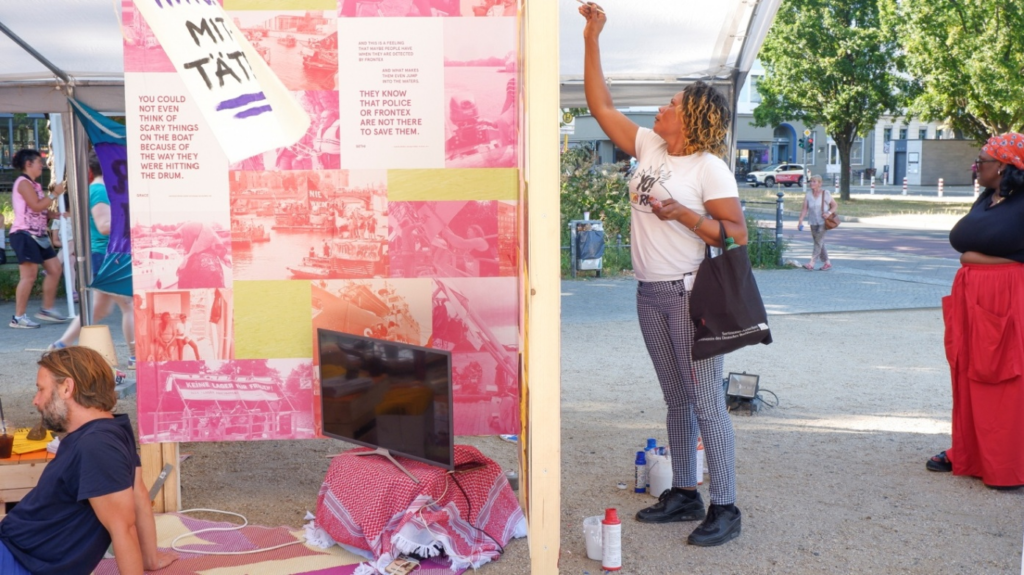
In the Zine, there are highlighted sentences that are meant to stand out, to give the words spoken and transcribed that much meaning and heaviness they deserve.
The mural was the works of art from one of the international guests, Vicky Shahjehan a trans/non-binary and self taught artist from Sri Lanka, Colombo’s Slave Island neighborhood. Vicky is known for her work with henna and uses this medium as a form of archiving stories as well focusing
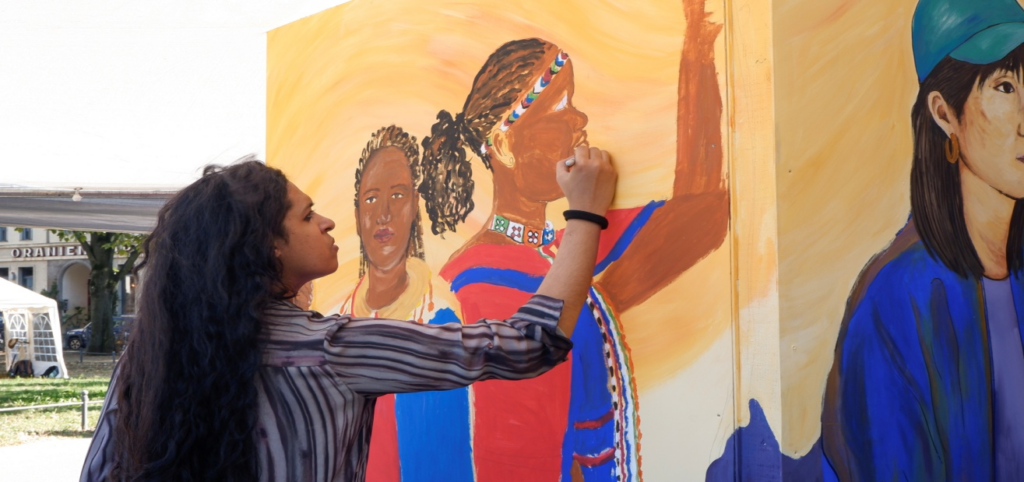
on issues around feminism, gender and freedom. She is also currently an ambassador of the fearless collective , working on multiple murals. Facilitating voices of communities, representing identities, focusing on major ongoing issues faced by the communities that are marginalized.

